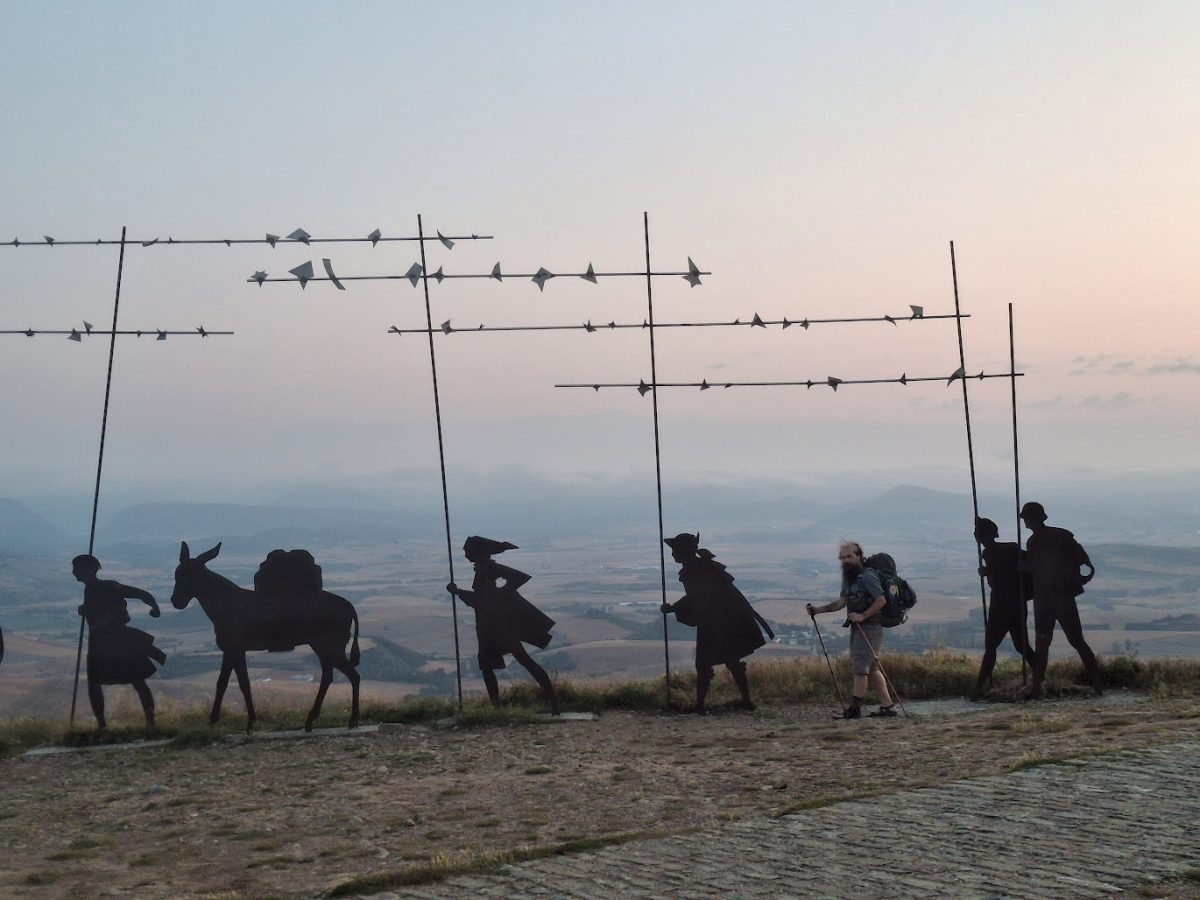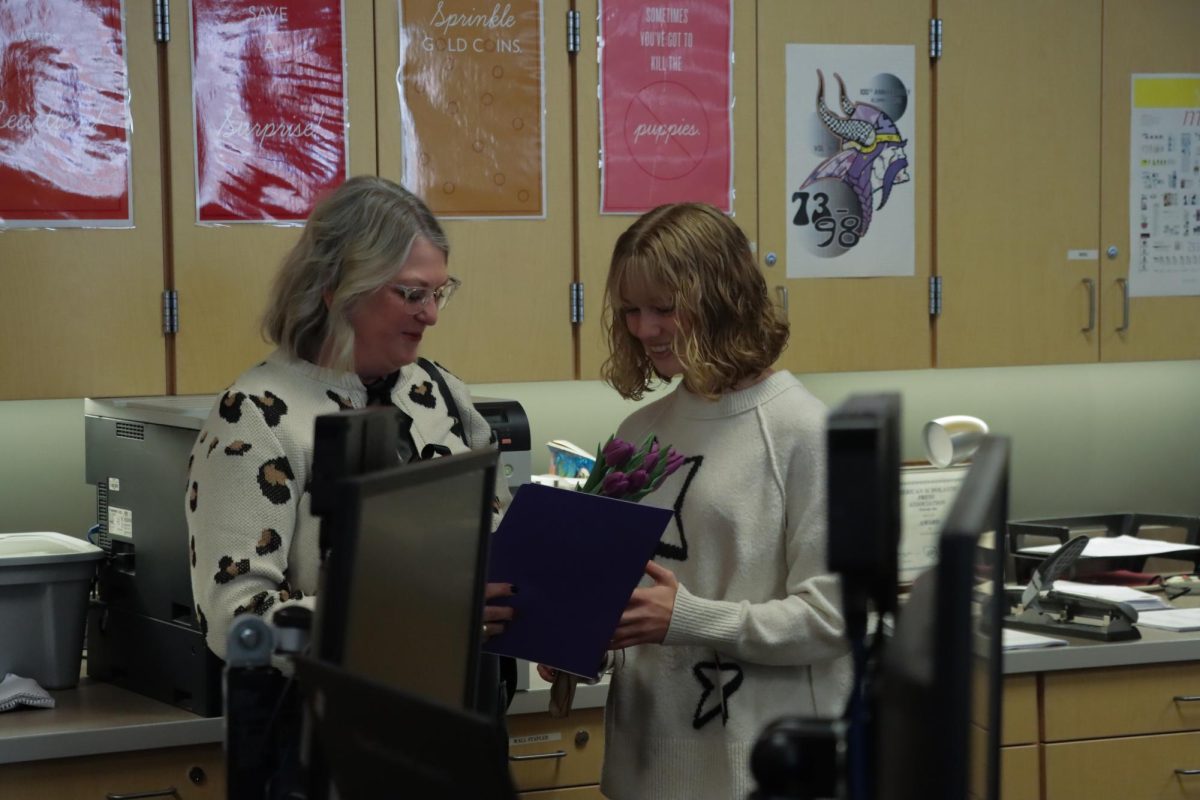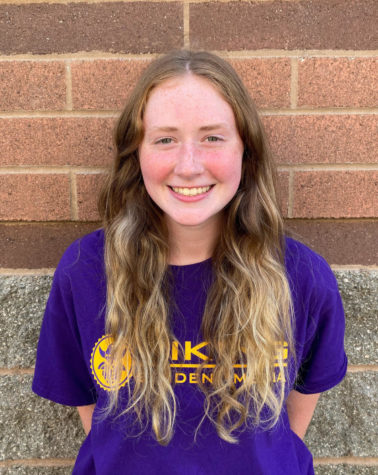Graduating high school doesn’t mean you have to stop pursuing your musical passions.
2019 alumna Autumn Lyle is a senior graduating from Pacific Lutheran University in Parkland in the spring. She is majoring in music education with a focus on secondary instrumental.
“My teachers inspired me to do music because I wasn’t good at anything else, they were always very kind and welcoming to me and made me feel safe,” Lyle said.
Lyle said that being involved in the high school music program changed her life.
“It helped me decide what I wanted to go to college for and what I wanted to do the rest of my life,” Lyle said. “It gave me some of the best friends I’ve ever had and brought me closer to all my music teachers. I was able to express myself in ways that I couldn’t express myself in any other class or elective.”
When beginning band, choosing an instrument is difficult, Lyle thought that she wanted to play clarinet, but their fifth-grade teacher had other plans.
“In fifth grade, my elementary music teacher, who just happened to play the trumpet, said ‘no, you’re not playing the clarinet, you’re going to be a trumpet player I promise.’ I said ‘Okay.’ then went to a pawn shop and bought a trumpet and the rest is history,” Lyle said.
Lyle says that she feels the pressure to please everyone and not let people down.
“[During every performance] I would want to always be better because I wouldn’t want to let [my teachers] down. All of my professors that I had at PLU or any of my peers that I’ve ever had any ensemble, it’s a team effort, and I wouldn’t want to be the one to let anyone down,” Lyle said.
Each teacher you will have will leave some kind of impact on you, for Lyle, band teacher Eric Ryan changed their life in many ways.
“He was always there for me. When I felt like no one else was there for me. He provided a safe space for me anytime I needed to sit down, have a mental health check, a breather, just someone to talk to. He was always there for me. He always believed in me when I felt like other teachers didn’t. I felt that he saw things in me that other teachers didn’t and I really appreciate him for that.” Lyle said. “He was always very kind and funny. We both took band and music seriously. I felt like we connected in that way. I can tell that he loves what he does, I felt that he could tell that I also loved what I did.”
Knowing what thing you want to do after high school is something that you are asked lots of in high school. Lyle knew what she wanted to do after she high school in seventh or eighth grade.
“I was doing everything I did a little bit of percussion when I first started out in fifth and sixth grade. I did choir but band was like my main focus, and I was always super involved. So, I kind of just knew that that’s what I wanted to do,” Lyle said. “It wasn’t until high school when I got super involved with band and being band president and drum major. It felt like I was already doing what college kids were doing. I got a little glimpse of the big chaos that music major is.”
Lyle was very involved in the music program throughout high school.
“I participated in pep band, so we did basketball and football games. I did the musical [Music Man] in the pit orchestra my junior year. I did solo ensemble, I always performed a solo and I was always in a large brass ensemble, and I was also doing it with choir as well,” Lyle said. “I also participated in the WNBA all state band and I also participated in YCP (young Chamber Players) with Dr. Lyman, we did a bunch of advanced music and small ensembles about twice a week.”
Between being involved in both band and choir, Lyle had to balance practicing for both band and choir. For practicing in music that does not include being in class, practicing is supposed to happen outside of class Lyle says.
“Besides being in class for hours a day, I think I practiced maybe seven or eight hours a week. I would try to split it up evenly between choir and band. They were both very important to me. So, I wanted to put the equal amount of time and effort into what I did,” Lyle said.
Between both choir and band, they took up 3-4 class periods of Lyle’s day throughout junior and senior year, balancing core classes and music classes was easier for her.
“I used to be very advanced at math and science and I loved all those core classes. So, I thought I was going to be an AP student and do all the honors classes. But then I realized that that’s not what was important to me,” Lyle said. “I took just basic senior English or whatever class like civics and the most basic classes I could so I can take more music classes. And that way, I didn’t have to put as much effort into those classes because they were easy for me.”
Being a part of the music program is important to Lyle, they get to be making music with all their friends.
“The connections that I make with being involved in music I have met obviously a lot of my best friends in college. We have the same major, so we do every single class together. I feel like they’re kind of on this journey with me, I’m not alone,” Lyle said. “The other thing I really like is networking. I’ve met a lot of incredible music educators around and outside the state. I feel like that’s brought me closer kind of to the more like professional side of things and has really shown me like just a little glimpse of what it would be like to be an actual educator.”
Lyle is ready to go into teaching right after she graduates PLU and wants to being teaching high school band students.
“At least right now I want to teach high school because I feel like it would be the easiest thing outside of coming straight from college. I feel like learning along the way with high schoolers is a lot easier than learning along the way with middle schoolers or junior high kids because I feel like they need someone who knows what they’re talking about,” Lyle said. “I kind of feel like high school kids, to start out, would be the best option for me. But I think eventually I might want to teach middle school or junior high level because I feel like that’s the most important age to teach.”
Having the right personality is important when you want to go into teaching. Lyle believes that they have those qualities.
“I feel like being empathetic, being very patient, being welcoming, loving, kind and having a sense of trust within the classroom would make me a good teacher. I want to provide a safe space for all my students in the future,” Lyle said.
2019 alumna Sophia Barkhurst is a senior at Pacific Lutheran University, majoring in choral music education.
Getting inspiration to get into music comes from many things for Barkhurst it started at a very young age.
“My mom when I was a baby started taking me to mommy and me music classes. I started piano when I was around seven. In elementary school, my teacher said ‘hey, have you ever thought about choir?’ I had not. So, she invited me to join the choir and that was around first grade,” Barkhurst said. “I had done a few outside of school choirs. One was the home of girls’ choir. And then the other one was Tacoma youth choir. I did all state Choir in high school, I tried out for that every year and did Valkyries when it was still a class that was offered there. When I was a Junior and Senior, I was doing Norselanders and concert choir.”
High school can impact students in many ways, and having a class that points you in the direction you want to take makes it better.
“Before high school is just like a fun thing that I enjoyed doing. Whereas when I was in high school in specifically choir, I realized that it was something that I can keep doing as like a career path,” Barkhurst said. “I [also] loved the social aspect of being in choir because you go into the classroom. It’s kind of just like an automatic friend group who all has this one thing in common, which is making music and singing together.”
Barkhurst says that people push you in different ways that you did not know you needed.
“[Choir teacher] Jason Brinker very much, pushed me in a way to be more of a leader than I was being. Like you are someone who’s going to keep doing this. So, you need to like kind of do the stuff I’m doing before you are like, on being taught how to do it on your own,” Barkhurst said.
Barkhurst had two different choir teachers while they were at Puyallup. Both of which showed them how things in the classroom should be.
“[Retired choir teacher] George Gunther was incredible. I think the thing that he pushed on me the most is building friendships and team building, treating music as if it were a sport,” Barkhurst said. “Jason Brinker had the same idea, and I think that he made it more fun in some ways. We have to care about each other but can also have fun in this room.”
Being a part of the music program brings many perks. Barkhurst says that it really is about community.
“I really do think it comes back to the community thing. I think it made it so much easier. Puyallup High School is a huge and I think it kind of made PHS small in a way,” Barkhurst said.
Knowing what you want in your future and planning it out along with pursuing it makes it overwhelming. Barkhurst made her decision in their senior year.
“I kind of thought I wanted to do it through most of high school, but I didn’t really know until my senior year that was what I was going to stick with. I knew I wanted to like do something that helped other people,” Barkhurst said. “I just didn’t know that it was music education until I started visiting a few colleges and being like, ‘oh, that’s what this like feels like to be in a room with other people who love music as much as I do.’”
Barkhurst is taking their time deciding on the age level they would like to teach.
“I’ve been like ‘I want to teach high school. High school is for sure where I want to be, they make it easy.’ I’m student teaching in a high school right now and I really love the ninth graders. So, I’m kind of starting to lean towards like the middle school kind of age group,” Barkhurst said. “I think it’s really fun to work with students who haven’t necessarily done choir in any kind of official capacity yet, and to be able to teach them beginner basics.”
Thinking of the way that you react to something that happens and making mistakes allows people to picture the kind of person you are.
“Being able to make mistakes, and able to say that you’ve made mistakes, is one of the best things you can do as a teacher because being the teacher that pretends that they know it all, makes you untrustworthy,” Barkhurst said. “I think another one is being able to talk to new people and be outgoing with what you’re wanting to talk about. It’s hard to be a quiet teacher in general for everyone.”
Barkhurst has advice for seniors and underclassmen alike who are currently making music.
“To seniors who are already involved in music, there is no reason to not at least continue participation,” Barkhurst said. “To underclassmen that either are or aren’t in music. It’s a great time filler. What I mean by that is that there’s not a better way to fill empty space than to make something that’s beautiful. With music, and I would say particularly choir, you can kind of jump in at any time. Even if you’re like, I can’t sing. A choir teachers’ jobs is to teach you to sing. Anyone can learn how to sing it’s a skill not like a you’ve been gifted, it’s absolutely a teachable skill.”




